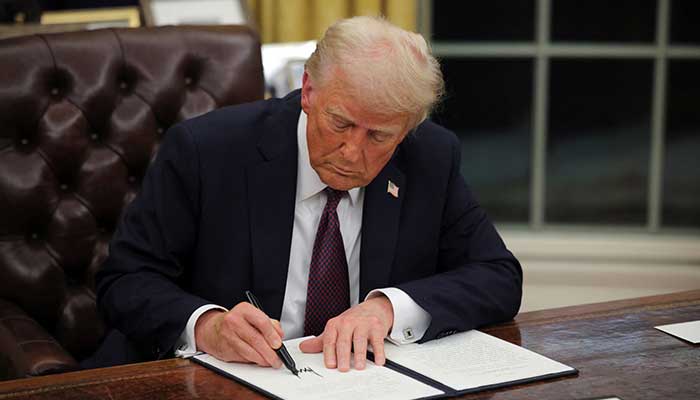PTBP Web Desk
Bangladesh’s International Crimes Tribunal sentenced ousted Prime Minister Sheikh Hasina to death on Monday for her role in ordering a deadly crackdown on a student-led uprising in 2024. The verdict, delivered in the capital Dhaka, concludes a months-long trial that has captured international attention and has stirred fears of political instability ahead of parliamentary elections expected in early February 2026.
The decision is the most dramatic legal action against a former Bangladeshi leader in decades. Hasina’s Awami League party has been barred from contesting the elections, and analysts warn that the verdict could trigger fresh unrest in the country, which has already witnessed sporadic violence in recent days.
The tribunal sentenced Hasina to life imprisonment on charges of crimes against humanity and handed a death sentence for ordering the killing of multiple individuals during the student protests. Reports indicate that there was cheering and clapping inside the courtroom following the announcement.
The ruling comes in Hasina’s absence. She fled to India in August 2024, shortly after being ousted from power. While the verdict can technically be appealed in the Bangladesh Supreme Court, Hasina’s son and adviser, Sajeeb Wazed, indicated that the family would not seek an appeal unless a democratically elected government included the Awami League.
The charges against Hasina relate to a student-led uprising in July and August 2024, which saw widespread protests across Bangladesh. Prosecutors argued that Hasina had directly ordered security forces to use lethal force against demonstrators.
A United Nations report suggests that the unrest resulted in up to 1,400 deaths, with thousands more injured, primarily due to gunfire by security personnel. Analysts describe the events as the worst violence in Bangladesh since the 1971 war of independence.
During the trial, Hasina was represented by a state-appointed defense lawyer, who argued that the charges were baseless and pleaded for her acquittal. Hasina herself dismissed the tribunal proceedings, asserting that a guilty verdict was “a foregone conclusion.”
Bangladesh has been tense ahead of the ruling, with at least 30 crude bomb explosions and 26 vehicles torched across the country in recent days. Fortunately, no casualties were reported.
In the lead-up to the verdict, Hasina challenged the legitimacy of the tribunal, calling it politically motivated. In an email interview with Reuters last month, she described the proceedings as a “charade” conducted by a kangaroo court under an unelected administration of her political opponents. She further claimed that she had been denied adequate notice of hearings and a meaningful opportunity to mount a defense.
Since Hasina’s departure in August 2024, Bangladesh has been governed by an interim administration led by Nobel Peace laureate Muhammad Yunus. While the country has remained largely peaceful under the interim government, political stability is yet to fully return, especially as elections approach.
The upcoming elections in February 2026 are expected to reshape Bangladesh’s political landscape. The exclusion of the Awami League, coupled with Hasina’s sentencing, has sparked debates over the fairness and transparency of the electoral process. Political observers caution that Monday’s verdict could exacerbate divisions in the country and lead to potential unrest among the Awami League’s supporters.
International media and human rights groups have closely monitored the trial. Observers highlight concerns over the fairness of the tribunal, given Hasina’s absence and allegations of political motivation. The case has raised questions about the independence of Bangladesh’s domestic judicial processes and the role of interim governments in politically sensitive trials.
Analysts warn that the verdict may have regional implications, as Bangladesh has historically been a pivotal country in South Asia. The political uncertainty could affect foreign investment, trade relations, and regional stability, especially in the lead-up to national elections.
While the verdict can be appealed, Hasina’s family has indicated they will hold off unless a democratically elected government allows the Awami League to participate. This stance underscores the ongoing political tension in Bangladesh and the uncertainty surrounding the future of its governance.
The tribunal’s ruling may also influence domestic security policies, as authorities prepare for potential protests or unrest. Law enforcement agencies are expected to remain on high alert, particularly in urban centers like Dhaka, Chittagong, and Sylhet.




